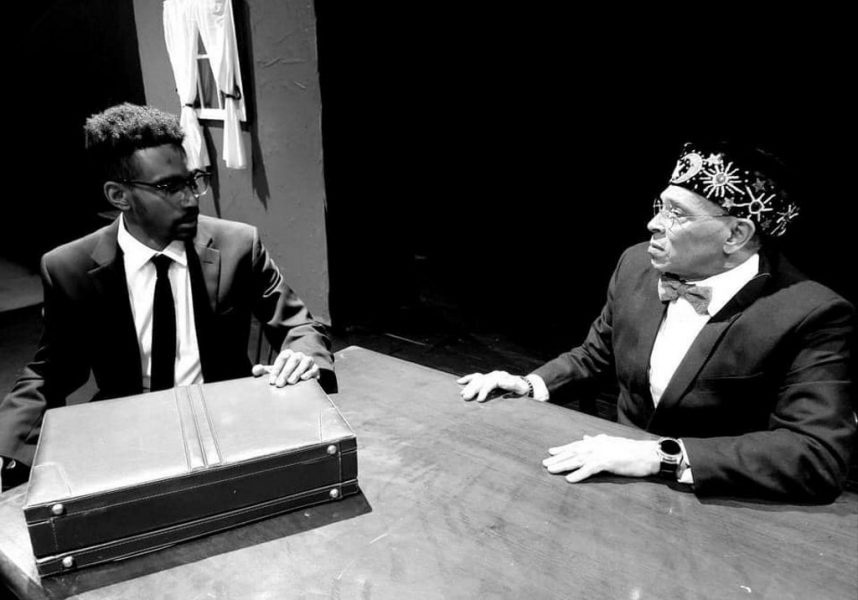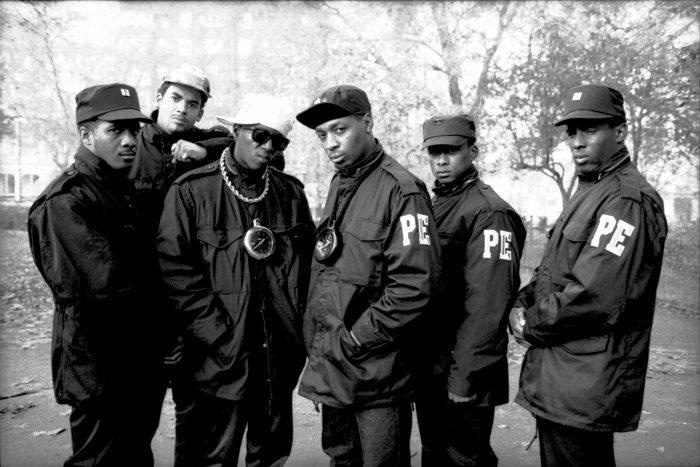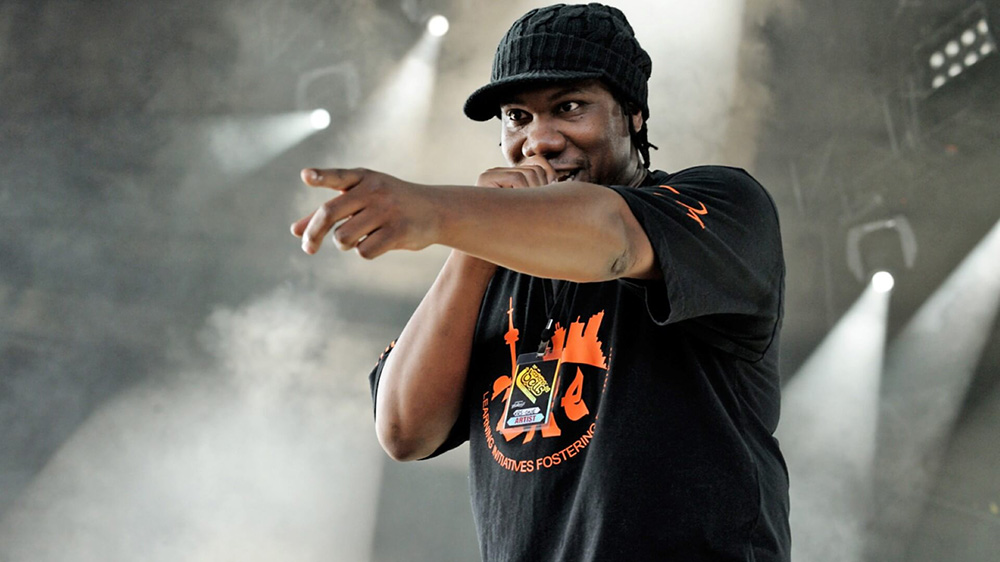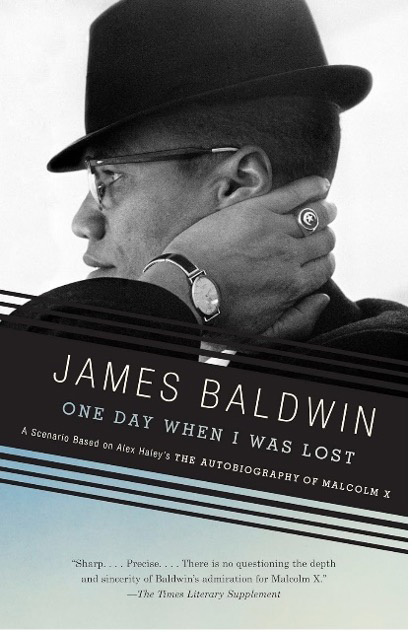 |
| Harlem, New York Rally, 1963 © Gordan Parks Foundation |
Malcolm X’s influence permeates American social, political, and cultural life. Many cities have a Malcolm X street, avenue, or boulevard. Plenty of schools, libraries, and other public buildings are named in his honor. What’s more, many artists have been inspired by the human rights leader’s life and philosophies. They have created music, visual art, plays, film, and literary works. Here are just a few examples of their artistic output.
Sculpture
 |
| (left) Malcolm X 16, 2016 (right) Malcolm X #3, 1969 © Barbara Chase-Riboud |
Over the course of 40 years, award-winning American-born visual artist, sculptor, novelist, and poet Barbara Chase-Riboud created a set of 20 Malcolm X stelae—monumental sculptures—of metal and fibers. Chase-Riboud’s technique and materials are an interplay between folds of cast bronze and aluminum with coils of wool and silk that are knotted, braided, looped, and woven. Her work juxtaposes constracting textures: soft versus hard, light against heavy, and tactile alongside rigid. Chase-Riboud has said she decided to dedicate the works to Malcolm X “because he was dead. It was a matter of memory, of doing a monument—not to his philosophy, but in the Latin sense of memoria. The work is pure abstraction, pure beauty—that’s the only thing I’m really interested in. Most activism sacrifices the aesthetic part of making art for the message. I never do that. For me, the message is the message.”
Poetry
Dozens and dozens of poets have attempted to capture the spirit of Malcolm X in their writings. Soon after his death, Broadside Press published a collection of poems. For Malcolm: Poems on the Life and Death of Malcolm X includes almost sixty pieces about his life, death, and the aftermath of his assassination. The book features the writings of Gwendolyn Brooks, Robert Hayden, Conrad Kent Rivers, Edward S. Spriggs, and many others.
Malcolm X
By Gwendolyn Brooks
For Dudley Randall
Original.
Hence ragged-round.
Hence rich-robust.
He had the hawk-man’s eyes.
We gasped. We saw the maleness.
The maleness raking out and making guttural the air
And pushing us to walls.
And in a soft and fundamental hour
A sorcery devout and vertical
Beguiled the world.
He opened us —
Who was a key.
Who was a man.
For Malcolm X: Poems on the Life and the Death of Malcolm X, edited by Dudley Randall and Margaret G. Burroughs, Broadside Press, 1969
Theatrical Works
Likewise, numerous playwrights have written and staged pivotal points of Malcolm X’s life—some true and some fictionalized. These plays have been presented across the US and the globe.
The Meeting
 |
| © Point Loma Playhouse |
The Meeting is a compelling play by writer Jeff Stetson written in 1987. It depicts the supposed meeting of two of the most important men of modern times—Malcolm X and Dr. Martin Luther King, Jr. Differing in their philosophies, but alike in their mutual respect, the two men debate their varying approaches to the same grave social problems. Together, they both realize that they are prepared to die for their beliefs.
 |
| © Otto Bettmann via Corbis |
In reality, the two men only met once, while in Washington, D.C., to watch the Senate debate the passing of the Civil Rights Act of 1964. On March 26, 1964, X and King spoke briefly with each other as they walked through the United States Senate. They were together for about a minute.
El Hajj Malik (El Shabazz)
El Hajj Malik (El Shabazz) is semi-documentary drama. The play’s title is the name given to Malcolm upon his pilgrimage to Mecca in 1964. The drama brings to the stage material contained in Alex Haley’s The Autobiography of Malcolm X and Malcolm Speaks, a collection of speeches by the human rights leader edited by George Breitman. It just so happened that Christopher Davis, the brother of composer Anthony Davis, starred in a production of the play. It sparked the brothers and their cousin, Thulani Davis, to develop an opera about the human rights leader.
When the Chickens Came Home to Roost
 |
| © Maryland Theatre Review/Mark Shorts |
The play by Laurence Holder is set at the headquarters of the Nation of Islam and dramatizes a pivotal period between Malcolm X and Elijah Muhammad—the disintegration of one of the most important relationships in African American history. The drama’s title comes from the comment made by Malcolm X about the assassination of President John F. Kennedy on November 22, 1963.
Music—Jazz
Christian McBride
 |
| Bassist and composer Christian McBride |
The Movement Revisited: A Musical Portrait of Four Icons is an oratorio comprised of four movements by Grammy Award-winning bassist and composer Christian McBride. The work pays homage to Rosa Parks, Malcolm X, Muhammad Ali, and Dr. Martin Luther King Jr. Composed in 1998 for small jazz combo, McBride expanded the composition ten years later for big band. The opus features the words of Parks, X, Ali, and King combined with gospel choir, and vocal and instrumental soloists. The original composition premiered in 2008, a few months before Barack Obama was elected US president. After Obama’s election, McBride visited the piece again, adding a fifth movement. This time the composer incorporated words from of the 44th president’s inaugural speech.
Music—Hip Hop
No other art form has embraced the philosophies and persona of Malcolm X’s than hip-hop. Rap artists of all styles have mixed their lyrics and beats with samples of Malcolm’s words. To many, he is the greatest and most influential African American in history.
Public Enemy
 |
| © Mikael ‘Mika” Väisänen |
| “Can’t Truss It” |
In 1991, Public Enemy released a critical acclaimed album. Apocalypse 91… The Enemy Strikes Black reached No. 2 in The Village Voice critics’ poll and Rolling Stone said the album was “nothing short of setting a sociopolitical agenda for the black community.”
KRS ONE
 |
| © Getty Images |
By All Means Necessary
The cover art for “By All Means Necessary” was inspired by the famous photograph that shows Malcolm X holding a rifle soon after his home was firebombed, KRS One and Boogie Down Productions created a cover photo and title as an homage to legendary icon. The album was released in 1988. By the way, KRS stands for Knowledge Reigns Supreme.
Gang Starr
 |
| © Martyn Goodacre via Getty Images |
| “Tonz ‘O’ Gunz” |
Record producer DJ Premier and rapper Guru formed Gang Starr, one of the best MC-and-producer duos in hip hop history. They are recognized as pioneers of jazz rap. The “Tonz ‘O’ Gunz” track features excerpts from Malcolm’s “Fire and Fury Grass Roots” speech.
Music—Motown
Martha and the Vandellas
 |
| © Evening Standard |
| “Dancing in the Street” |
“Dancing in the Street” was released in the summer of 1964—Freedom Summer. That summer thousands of volunteers campaigned throughout Mississippi in attempt to register African Americans to vote. Thousands were arrested, churches were bombed, and three civil rights workers were murdered. That summer was also when Malcolm X declared “We want freedom by any means necessary.” Considered a summer party song, many young activists heard “Dancing in the Street” as a call to action. Lyrics such as “Calling out around the world,” and “Summer’s here and the time is right” were interpreted as rallying cries to mobilize. For better or worse, the song became the anthem for demonstrations and riots across the country.
Television
One Day When I Was Lost
 |
| © Vintage International |
One Day When I Was Lost is an unproduced television drama from one of the country’s great writers. James Baldwin based the screenplay on Alex Haley’s The Autobiography of Malcolm X. The Times Literary Supplement hailed the work as “Sharp…. Precise…. There is no questioning the depth and sincerity of Baldwin’s admiration for Malcolm X.” The manuscript was published in 1969.
Film
One Night in Miami
 |
| © Patti Perret/Amazon Prime Studios |
One Night in Miami, directed by Regina King in her feature film debut, is a fictional account of an incredible night where four icons—Malcolm X (Kingsley Ben-Adir), Cassius Clay (Eli Goree), Sam Cooke (Leslie Odom, Jr.), and Jim Brown (Aldis Hodge)—come together to discuss their roles in the civil rights movement. Based on Kemp Powers’ award-winning play of the same name, this riveting drama manages to capture the essence of each character’s struggle for justice and equality. The film received critical acclaim upon its release in 2020, with particular praise for its performances and Regina King’s direction.
Malcolm X
 |
| © Warner Bros./Photofest |
Malcolm X was released in 1992. Directed by Spike Lee, the film is a gripping biographical drama that delves deep into the life and transformation of the eponymous civil and human rights activist. Denzel Washington, who plays Malcolm, delivers a powerful performance, earning him an Academy Award nomination for Best Actor. The film explores the influential figure’s early life, his time in prison, conversion to Islam, and eventual rise as a prominent leader within the Nation of Islam. With its compelling narrative and intricate portrayal of racial tensions in America during the mid-twentieth century, Malcolm X has become a defining piece of cinema that continues to resonate with audiences today.
Blood Brothers: Malcolm X & Muhammad Ali
 |
| © Netflix |
Blood Brothers: Malcolm X & Muhammad Ali is an insightful documentary that looks at the complex relationship between Malcolm X and Muhammad Ali. Directed by Marcus A. Clarke and released in 2021, the film showcases unseen archival footage alongside interviews from close friends and family members. It deeply explores how X and Ali’s bond was forged through shared values but was ultimately strained due to political tensions within Nation of Islam. It sheds light on their personal lives while examining broader issues such as race relations, religion, and activism during a tumultuous time in American history.
X: The Life and Times of Malcolm X runs Febuary 4-March 9, 2024 at McCaw Hall. Tickets and info at seattleopera.org/x.





No comments:
Post a Comment